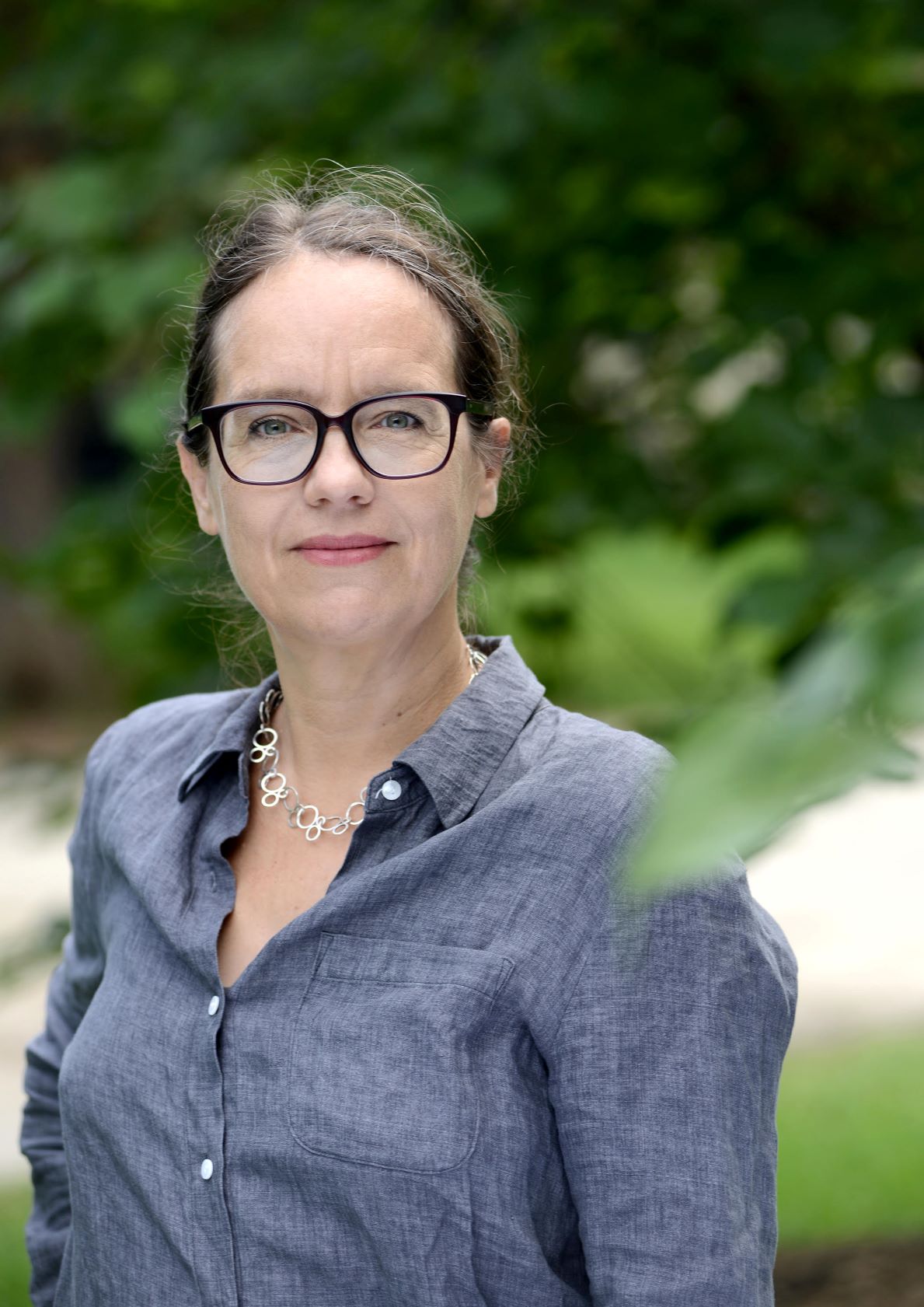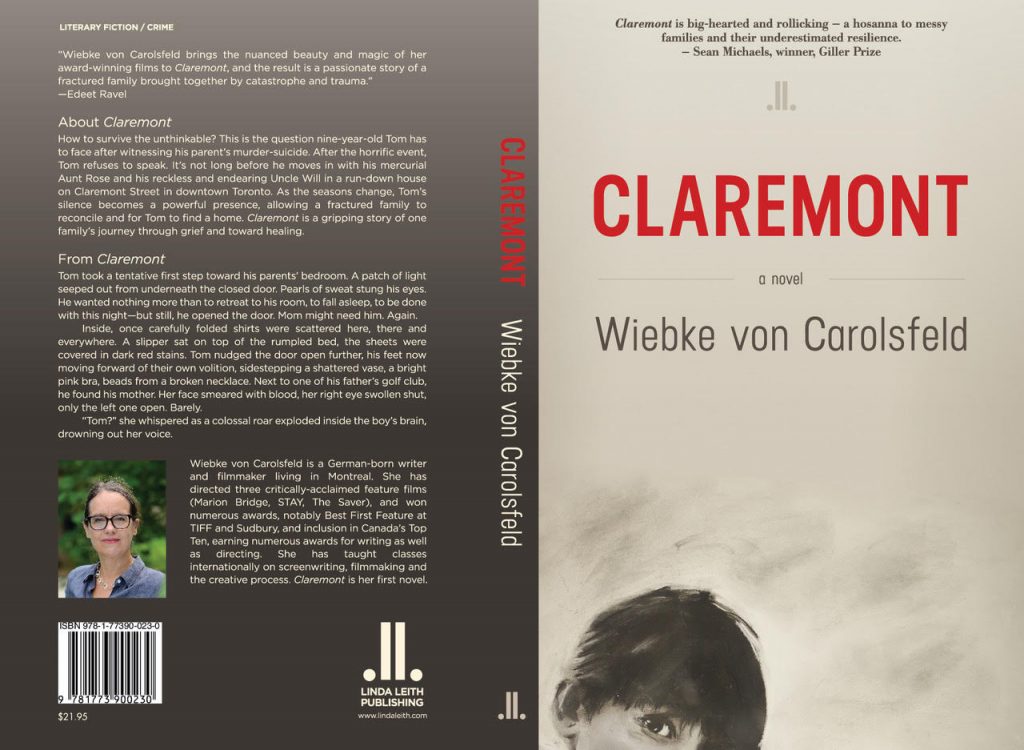
In Conversation with Wiebke von Carolsfeld
Wiebke von Carolsfeld is a German-born filmmaker and writer based in Montreal. She has directed three critically acclaimed feature films (Marion Bridge, STAY, The Saver) and she has won numerous awards, including Best First Feature at TIFF. She also teaches classes internationally on screenwriting, filmmaking, and the creative process. Claremont is her debut novel. SoGerman’s Karolin Tuncel had a chance to interview Wiebke von Carolsfeld ahead of her book launches in Toronto and Montreal.
SoGerman: Before becoming the famous filmmaker you are today, your application for Ryerson University was denied. How did this influence your career path?
Wiebke von Carolsfeld: First of all, I’m not a famous filmmaker. I’m a working filmmaker with three features to my credit as a director. This – in an industry that is heavily slanted towards male stories – is an achievement I am very proud of, but famous: no. As for Ryerson: yes, I was denied entrance for not having grade 13 in Ontario, despite 13 years of schooling in Germany (Abitur), four years at the University of Cologne plus a two-year apprenticeship at a publisher that included trade school. At first, this rejection made me feel defeated. I’d been working hard to find my place in Canada, to improve my English. So, being rejected on this formality just seemed unfair. So unfair actually, that it energized me to take matters in my own hands . I wound up volunteering all over the place and eventually got a job as a trainee assistant editor on David Cronenberg’s film M Butterfly. By the time I would have graduated from Ryerson, I had already edited my first feature film – with no student debt to pay off. So in the end, what this rejection taught me is that the journey does not need to end just because one door closes. Resilience is necessary to survive in the arts, and in life in general. So instead of giving up when one person said no, I went out and found others who said yes. In many ways that rejection was the right lesson for me at the right time.
SoGerman: Your movie “Stay” is not only about love, but it also tells the migration story of a young woman. What’s your migration story, what does migration mean to you?
Wiebke von Carolsfeld: Migration, or the quest to find a home, a place to belong, is at the heart of most of the stories I have told so far. For me, STAY is about five different characters who are all searching for a home, a place to stay. Agnes in Marion Bridge is also looking for a home, albeit right back in Cape Breton where she came from. And Fern in The Saver is fighting to keep her home, her independence, while learning that what she needs most to survive is community. I emigrated from Germany to Canada as a young woman, so this quest for community, for a place to call home, is close to my heart. After arriving in Canada, I had to completely redefine what I would do with my life. My first love had been literature, but when I first got here my English was rather poor. So I had to adjust and that’s how I wound up in film where having an accent didn’t matter. It is only now, thirty years later, that I get to go back to my first love by publishing my first novel, Claremont, which is one of those wonderful moments where life comes full circle.
So in the end, what this rejection taught me is that the journey does not need to end just because one door closes.

SoGerman: You are known around the world for your enchanting movies. Now you are about to publish your first book entitled “Claremont”. What made you decide to express yourself in the form of a novel this time, instead of making another film?
Wiebke von Carolsfeld: I love film and the way images can express emotions, how actions reveal what is going on inside a character. I love the magic that happens when actors take your words and make them their own – but literature is unparalleled in its ability to allow us insight into the interior world of people. Claremont is about grief, about shifting interior landscapes in multiple characters after experiencing tragedy – and that is difficult to express in film. Additionally, Claremont is told from four different points of view (Tom, the child at the centre of the story, and then two of his aunts plus an uncle). Telling this story as a novel let me explore how the same event can feel so differently to people involved, depending on who they are in the world and how they experience themselves in it. Because of the interior nature of grief, telling this particular story as a novel made sense. Plus, I didn’t need a couple of million dollars to tell it. Film is very expensive and raising money to tell intimate stories like this is almost impossible, so expressing myself in prose made it possible for me to tell this story. I could just sit down and write it – though of course there is no ‘just’ when it comes to writing a novel. In the end, it took many years and the help of many to get it ready for publication.
SoGerman: Can you tell us a bit more about the writing process of “Claremont”? How was it different from your past projects?
Wiebke von Carolsfeld: Turns out writing a novel is a lot of work! A lot a lot a lot of work! I have edited ten plus feature films, written two, directed three – all of it is a lot of work but none of that compares to writing a novel. It took me many years to finish a first draft. Many times of pushing forward even when I felt like giving up, of motivating myself by myself, convincing myself that this was worth doing, even if I had zero guarantees that this manuscript would ever be published. And then there is the problem with asking for feedback. I love getting feedback but it takes so much time to read a novel. So I’m extremely grateful to the many friends who took on the task of reading and commenting over the years. I could not have done it without them.
SoGerman: Do you already have any plans for a future film or book?
Wiebke von Carolsfeld: Yes, I am working on two film projects and a new novel. The new novel will be about my Great-Grandmother Charlotte who, born to upper-society in Saxony, found herself in 1919 divorced and penniless with four young children. The novel will tell her incredible life story, which saw her immigrating to Canada at age 70. You see, another migration story coming up.
Watch the trailer for The Saver here:
THE SAVER trailer from Prospector Films on Vimeo.